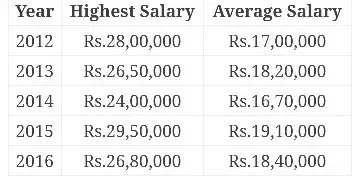What is BPT?
BPT stands for Bachelor of Physiotherapy. It is a comprehensive 4.5-year undergraduate degree program that focuses on the science of physical movement and rehabilitation. Physiotherapists, the professionals trained in this field, use a combination of hands-on techniques, exercise programs, and education to help patients regain mobility, manage pain, prevent further injuries, and improve their overall quality of life.
Key areas covered in a BPT program typically include:
- Anatomy and Physiology: In-depth study of the human body’s structure and function.
- Kinesiology and Biomechanics: Understanding how the body moves and the forces involved.
- Therapeutic Modalities: Learning about heat, cold, ultrasound, and electrical stimulation in treatment.
- Neurological and Musculoskeletal Rehabilitation: Techniques for conditions affecting nerves, muscles, and bones.
- Cardiopulmonary Rehabilitation: Helping patients with heart and lung conditions.
Average BPT Salary in India
A Bachelor of Physiotherapy (BPT) graduate in India can expect varying salary levels depending on several factors. Here’s a breakdown to help you understand the potential earnings:
- Fresh Graduates: If you’re just starting out in the field, your initial salary will likely fall between ₹20,000 to ₹35,000 per month.
- Experienced Professionals: With experience and specialization, physiotherapists can earn significantly more, ranging from ₹40,000 to ₹80,000 per month or even higher.
Factors Influencing Salary:
- Experience: Your years of experience play a crucial role in determining your salary.
- Location: Metropolitan cities typically offer higher salaries compared to smaller towns or rural areas.
- Employer: Government hospitals, private clinics, sports organizations, and rehabilitation centers all have different pay scales.
- Specialization: Focusing on areas like sports physiotherapy, neuro-rehabilitation, or geriatric care can lead to higher earning potential.
Factors Affecting BPT Salaries
Several factors influence the salary potential of a Bachelor of Physiotherapy (BPT) professional. Here’s a breakdown of the key determinants:
-
Experience: As with most professions, years of experience directly correlate with increased earning potential. Seasoned physiotherapists typically command higher salaries.
-
Location: Cost of living plays a significant role. BPTs in major metropolitan areas often earn more than those practicing in smaller towns or rural settings.
-
Employer: The type of employer matters. Government hospitals may offer lower starting salaries compared to private clinics, rehabilitation centers, or sports organizations.
-
Skills and Specialization: Advanced skills and specializations (e.g. sports physiotherapy, geriatric care, neuro-rehabilitation) can lead to significantly higher compensation due to increased demand and expertise.
-
Additional Factors: Other factors like certifications, continuing education, and demonstrated leadership abilities within the profession can also positively impact a BPT’s salary.
Career Opportunities for BPT Graduates
Hospitals (government and private), rehabilitation centers, sports teams and organizations, fitness centers, and private practice offer diverse pathways for BPT graduates. Here’s a deeper look at why these fields are so appealing:
- Hospitals: Provide broad exposure to acute care, surgical recovery, and management of chronic conditions, offering ample learning opportunities.
- Rehabilitation Centers: Specialize in restoring function after injuries, surgeries, or neurological conditions, allowing for focused, in-depth patient care.
- Sports Teams: Offer a dynamic environment focused on athlete performance, injury prevention, and rapid rehabilitation for return-to-play.
- Fitness Centers: Promote preventative care and wellness, with a potential emphasis on exercise programs for healthy individuals or those with specific needs.
- Private Practice: Grants autonomy and flexibility in patient populations with opportunities for business development and specialization.



